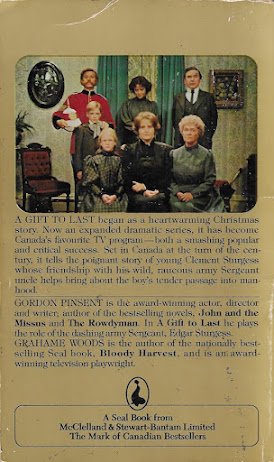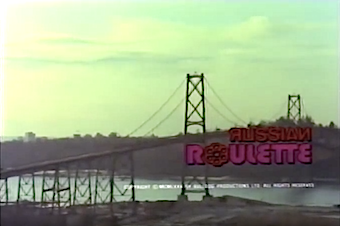A Gift to Last
Gordon Pinsent and Grahame Woods
Toronto: Seal, 1978
215 pages
Gordon Pinsent celebrated his ninetieth birthday last summer. I recognized the day – July 12th – by raising a glass and downing its contents... and then I thought of this book.
A Gift to Last was a Salvation Army Thrift Store score. Did I pay fifty cents or a dollar? The sight of it brought back memories. A Gift to Last began in 1976 as a critically-acclaimed made-for-TV Christmas movie. Its popularity spawned a television series that ran for three seasons before Pinsent pulled the plug.
In any other country, A Gift to Last would be aired annually as a Christmas classic. I saw it only once, in my adolescence, and so have to rely on this novelization. The early pages follow a familiar pattern. We begin with Harrison Sturgess – his very name suggests a stick-in-the-mud – the father of two children: sensible, strong-willed Jane, and "pale-skinned, fragile-looking" Clement. You might guess which child Harrison favours.
Clement is the novel's protagonist, though his Uncle Edgar is the hero. Portrayed by Pinsent, Edgar is larger than life and stronger than nature. He appears on Christmas Eve 1898, having made his way through a blinding snowstorm to his bother's expansive home in small town Ontario. Edgar is the black sheep of the family in that he joined the Royal Canadian Regiment, instead of following dour brothers Harrison and James into the Sturgess tannery business. A joker, a singer, a teller of tall tales, and heavy drinker, Edgar has an eye for the ladies. You might guess which brother this reader favours.
I believe the novelization is faithful to its source material, but can't say to what degree because both movie and series haven't aired in over four decades. My memory is just not that good. I do remember that the movie was framed by Clement as an old man looking back on that Christmas of his youth. The novelization abandons all things 1976, instead presenting a linear story that begins in fin de siècle Tamarack (the series' fictitious small Ontario town) and ends just a few year later. Things happen, and as in the very best television, strength lies in the ways in which characters react and interact in the face of these events.
The first episode of the series – chapters four through six in the novelization – revolves around the illness and death of Harrison Sturgess (because Alan Scarfe, who'd played the character in the movie, was committed to the Stratford Festival). His unexpected demise changes the dynamic of the Sturgess family. In black silk weeds and weeping veil, the widowed Clara withdraws from her children, retreating into memories of her late husband. Cold and calculating James sees his chance to not only expand the tannery, which Harrison opposed, but control his later brother's finances. Eleven-year-old Clement, who is told he is now the man of the house, struggles with the distant relationship he had with his dead father. Edgar, who recognizes his surviving brother's conniving, is torn between duty to family and the Dominion.
Following the hot mess "shapeless jumble" that was The Whiteoaks of Jalna (1972), A Gift to Last is an all-too-rare example of Canadian television period drama. Like the programme, the novelization is rich in history. In her mourning, Clara recalls a trip to Montreal, where William Notman took her portrait, and she visited Savage, Lyman & Co on Notre-Dame Street.
Grahame Woods' novelization is unembellished, as one might expect from a former screenwriter. He understands pacing, story, and the use of dialogue, making for an entertaining adaptation of an entertaining show.
Grahame Woods' novelization is unembellished, as one might expect from a former screenwriter. He understands pacing, story, and the use of dialogue, making for an entertaining adaptation of an entertaining show.
Novelizations of television programmes seem such quaint things today. Relics of a time before Betamax, next to the Fotonovel, they were the only way to revisit shows and movies on demand. Not that A Gift to Last made it to Betamax or VHS or Laserdisc or DVD. The series has never been offered by any streaming service. Hell, CBC Gem doesn't even offer The Beachcombers.
How I wish I could see it again. Until then, I've got this.
A Christmas Miracle: I read A Gift to Last on Christmas Day, and wrote the above on Boxing Day. The very next day, December 27, someone going by the name of Chance Wolf uploaded the movie to YouTube:
As it turns out, my memory wasn't so far off. The novelization pares down the script somewhat. Old man Clement appears more than I remember, and is much more sour. I didn't remember anything of the father's early morning drinking. Even more remarkable, my memory held nothing of actress Barbara Gordon's orange lounging attire.
Credits: The cover credits the novel to Gordon Pinsent and Graham Woods. The title page clarifies:
A Christmas Miracle: I read A Gift to Last on Christmas Day, and wrote the above on Boxing Day. The very next day, December 27, someone going by the name of Chance Wolf uploaded the movie to YouTube:
As it turns out, my memory wasn't so far off. The novelization pares down the script somewhat. Old man Clement appears more than I remember, and is much more sour. I didn't remember anything of the father's early morning drinking. Even more remarkable, my memory held nothing of actress Barbara Gordon's orange lounging attire.
Trivia: Gordon Pinsent co-wrote and sang the theme song. It was released as a single by the CBC and on South Africa's Plum label.
By eight o'clock, things had got quite serious and maudlin. Edgar decided that enough was enough, did a quick shuffle-step and started to sing.
In the middle of Auntie's petunias,Where I thought I'd rest for a spell,There along came a couple of liliesAnd their names were Virginia and Nell...
"Not another word of that song, you old fool, Lizzy sniffed back a tear."But you taught it to me."She slapped at him. "I did not. Have you ever heard anything quite so foolish.
Darn that Lizzy Sturgess for cutting him off.
More trivia: In 1978, the made-for-TV movie was adapted to the stage by Alden Nowlan and Walter Learning.
Object and Access: A mass market paperback. Eleven stills feature on the interior covers. Were this an American production they would've been interior plates. The novel itself is followed by the first two chapters of Charles Templeton's thriller An Act of God, "to be on sale August 23rd [1978], wherever paperbacks are sold."
As far as I've been able to tell, A Gift to Last enjoyed just one printing. I've not been able to find it in any library catalogue. A handful of used copies are listed for sale online, ranging in price from US$3.89 to US$34.97. Condition is a factor.
As far as I've been able to tell, A Gift to Last enjoyed just one printing. I've not been able to find it in any library catalogue. A handful of used copies are listed for sale online, ranging in price from US$3.89 to US$34.97. Condition is a factor.














































